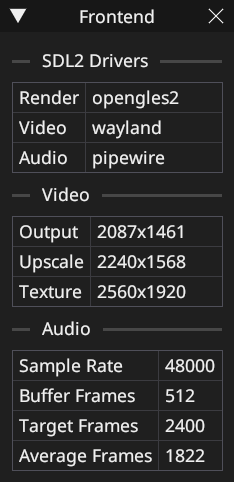Try it in your web browser:
clownmdemu.clownacy.com
Windows EXE:
https://github.com/Clownacy/clownmdemu-frontend/releases/tag/v0.5.1
Source code:
https://github.com/Clownacy/clownmdemu-frontend
Even-Further-Improved Audio Playback
It was pointed out to me that my Mega Drive emulator has another source of audio distortion: while v0.5 had managed to fix the audio skipping that was caused by audio being generated too quickly, there was still crackling that was caused by the FM or PSG audio being truncated by 1-3 samples every frame.
The reason for this is that the audio resampling process is prone to rounding error, meaning that if 400 samples were desired, 401 samples may be produced instead. Because there are two resamplers running simultaneously (one for the FM audio and one for the PSG audio), it’s possible for each of them to output a different number of samples. When this happens, the number of samples which are output is capped to the smaller of the two. This causes the audio with the larger number of samples to skip slightly, creating a crackling noise.
At first, I tried fixing this by making the recently-added dynamic audio sizing system apply to the FM and PSG audio separately, but, while this did eliminate the crackling noise, it caused the two audio sources to frequently desynchronise with each other, causing music to play with disjointed timing.
A proper fix was achieved by reworking the resamplers to always generate an exact number of samples. By doing this, the FM and PSG audio are always perfectly synchronised, and no excess audio frames are produced. At last, perfect audio delivery!
Frontend Debugging
While working on v0.5’s dynamic audio sizing system, I became interested in monitoring the audio buffer. I had added some code to print statistics to the debug log, but this was messy and so it was never included in the released version. Even once the system was complete, I wanted to be able to keep on eye on how it was operating to ensure that it was working correctly. Instead of keeping the hacked-together debug logging code around forever, I made it into a proper debugging menu!

Various useful little bits of information are displayed here, particularly the target and average numbers of audio frames. The closer these numbers are; the better: if the average becomes too low, then audio drop-out occurs, and if the average becomes too high, then latency occurs. Additionally, there are statistics for the framebuffer upscaling, which is nice for ensuring that the non-integer scaling is working optimally. The list of SDL2 drivers has been moved here from the About menu too, making it easy to see which APIs SDL2 is taking use of. Here you can see my painfully contrarian OpenGLES2, Wayland, and PipeWire configuration. Because OpenGL 2.1, X11, and PulseAudio are so last year.
C++ Refactoring
The frontend has been receiving more C++ refactoring to make it less C-like and more exception-safe. Particularly, instead of using ‘fake’ constructors and destructors that are just regular methods, the frontend’s classes have been converted to use real constructors and destructors. This had many implications for field lifetime and initialisation, requiring even further refactoring. I’ve also eliminated the need for manually-defined destructors from a number of classes, leveraging smart pointers and the like to make the automatically-generated ones sufficient.
The strictness of object-oriented code has helped expose a number of design deficiencies already, such as the configuration loader calling methods of the audio output object before it had even been initialised. It has also encouraged better factoring of the code by nudging me towards splitting the audio device logic from the audio queuing system, which coincidentally makes it simpler to port to other APIs. Overall, I’ve enjoyed getting to know modern C++ better, and think that it benefits the codebase quite a bit.
Hopefully, this shake-up to the codebase has not introduced any bugs nor instability. If it has, expect to see some small hotfix updates in the coming days.